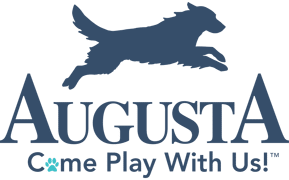
Love, wonder and worry seem to go hand in hand sometimes. This is especially true when you love a dog. While people and dogs have developed effective ways to bridge our language gap, dog parents are often left curious about what their dogs’ behaviors mean, if there’s cause for concern, and if there’s something they should be doing differently. At Augusta Dog Training, we field many questions from dog parents looking to better understand their canine companions. We’ve compiled a list of some of the most frequently asked questions from dog parents with our answers. Keep reading to learn a little more about your favorite furry friend.
1. Why does my dog eat grass?
This is one of the most common questions dog parents have. Most new dog parents don’t realize just how common this habit is, and even seasoned dog parents may not be able to tell if it’s worrisome or not. Most dogs eat grass out of boredom or because they just like the taste. It could also indicate that your dog is lacking a certain nutrient they need. If you notice your dog eating grass frequently, check in with your veterinarian about what you’re feeding them to make sure they’re getting the proper nutrition. Dogs may also eat grass because they’re feeling sick and are looking for a natural remedy to ease an upset stomach. This should only be a worry if you notice your dog suddenly eating a large amount of grass. If that happens, bring your pup in right away.
2. Why is my dog panting?
Another behavior that dog parents ask about is panting. When is it normal and when should it be a cause for concern? While most folks know that dogs pant to release excess heat, it can be hard to tell if something else may be going on. Causes of abnormal panting can include stress or pain, plus some more serious conditions. If your dog is panting in unusual circumstances, keep an eye on it. If it persists, contact your veterinarian for some guidance.
3. Should I brush my dog’s teeth?
Yes! Dental health is very important to our canines and our canine’s canines. Just like with people, poor dental habits can cause serious concerns like gingivitis, periodontitis and even blood infections. Doggie dental care is something new to many dog parents, especially those who grew up before proper dental hygiene was common for pets. There are a number of dog toothbrushes and toothpastes on the market, as well as special bones and chews that can help support their dental health.
4. Why does my dog eat… number two?
As dog parents, you’re no stranger to the yucky side of loving a dog. But some things are extra icky, like the habit of coprophagy. While this behavior is not pleasant to witness or even think about, it does have a root in instinct, as den mothers would eat the deposits of their young to keep the den clean and prevent detection from predators. Most dogs grow out of this habit, but some do not. Additional reasons why your dog might partake in this sort of “snacking” include poor diet or digestive problems, stress, boredom, attention-seeking or avoiding punishment for a potty accident. Some dogs eat number twos because they like them. Make sure you’re giving your dog proper attention, nutrition and limited opportunities to eat what is best left uneaten.
5. Can I make my dog’s food?
Yes, you can absolutely make your dog’s food, but understanding canine nutrition is complex. While it’s becoming increasingly common for people to prepare meals for their dogs, it’s important to use trusted, vetted recipes and metrics for their food. You should consult with your veterinarian for guidance on what would benefit your dog nutritionally. It’s also important to create a comprehensive list of dog-unsafe foods, so that you don’t throw something in for flavor that could cause your dog harm.
Take Care of Your Dog with Augusta Dog Training
Augusta Dog Training is a trusted training, daycare and boarding facility serving the Twin Cities Metro area. We take the human-dog bond very seriously, and invest time and study into understanding canine behaviors so that we can help improve their home relationships and habits. Our experienced trainers offer group classes, boarding and in-home training to help your dog learn good manners and skills, while also educating you on the nuances of canine behaviors, personality and habits. Visit us online to learn more about our services.


